|
|
|
Sort Order |
|
|
|
Items / Page
|
|
|
|
|
|
|
| Srl | Item |
| 1 |
ID:
165094
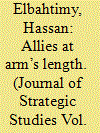

|
|
|
|
|
| Summary/Abstract |
This article examines Egyptian–Soviet relations in the run up to the 1967 Arab–Israeli war. It argues that Egypt and the Soviet Union stumbled into brinkmanship with little coordination and no agreement on common objectives or goals. The article demonstrates how frustration and mutual disappointment were recurring features of the interactions between the two allies during the critical weeks prior to the war. In doing so, the article exposes new aspects of how Cairo and Moscow managed their alliance and assesses what that means to our understanding of the origins of this transformative war. These conclusions challenge revisionist accounts that attribute the start of the war to Egyptian–Soviet collusion and some traditional narratives that present the Soviet Union as an enterprising risk-taker invested in regional brinkmanship. The article draws heavily on Egyptian and Arabic language sources to examine Egyptian–Soviet interactions during this key period of Middle Eastern history.
|
|
|
|
|
|
|
|
|
|
|
|
|
|
|
|
| 2 |
ID:
147882
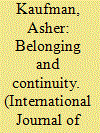

|
|
|
|
|
| Summary/Abstract |
This article analyzes spatial perceptions and practices of Druze citizens of Israel before, during, and after the Israeli occupation of South Lebanon in 1982−2000. It argues that the opening of the Israel–Lebanon border in 1982 and its closing in 2000 had three effects: it generated internal social, political, and cultural changes within the community in Israel; it changed the relationship of the Druze with the State of Israel; and it reestablished strong ties with their coreligionists in Lebanon and Syria. Drawing insight from the field of border studies, the article shows how Druze citizens of Israel live concomitantly in state and suprastate spatial scales, forming a third, integrated or hybrid, spatial scale. The article proposes using the concept “hybrid spatial scale” as a tool for studying communities such as the Druze that operate on multiple territorial scales.
|
|
|
|
|
|
|
|
|
|
|
|
|
|
|
|
| 3 |
ID:
162526


|
|
|
|
|
| Summary/Abstract |
Following the June 1967 Six-Day War, the Soviet Union and Britain invested significant efforts in rehabilitating their relations with the Arab countries, notably Egypt. While both supported the withdrawal of Israel from the Arab-occupied territories, the two countries differed over the nature of the settlement. Still, at the UN Security Council, the Soviet Union supported the British draft resolution for solving the Middle East conflict. Cold War interests and competition over influence in the Middle East, however, led the Soviets to launch a public campaign against British policy in the Middle East and prevented the two countries from joining efforts to bring about a breakthrough in the Arab–Israeli conflict.
|
|
|
|
|
|
|
|
|
|
|
|
|
|
|
|
| 4 |
ID:
166767
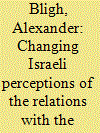

|
|
|
|
|
| Summary/Abstract |
Since 1948/1949 The International Committee of the Red Cross (ICRC) has been synonymous in the Arab–Israeli context with processes of exchanging prisoners and caring for human lives. After the 1967 war the ICRC changed in status from that of a mediator to that of the executive arm of larger forces. The processes leading to the partial demise of the ICRC are clearly identified in retrospect. It has to do with the asymmetry of perceptions between Israel and the organisation. Israel did not agree to the application of the Fourth Convention in the territories. The ICRC believed that this population fell under the Convention and therefore under the ICRC. Furthermore, the ICRC failed in getting the Israeli POWs back home, especially after the conclusion of the War of Attrition in 1970. The resulting feelings eliminated in the Israeli decision makers' minds the role that the ICRC saw for itself in future POW exchange deals. After the 1973 war the ICRC would lose its position as a negotiator, leaving that arena to other international actors.
|
|
|
|
|
|
|
|
|
|
|
|
|
|
|
|
| 5 |
ID:
190115
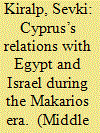

|
|
|
|
|
| Summary/Abstract |
The Makarios era (1960–1977) corresponded with two major regional disputes, with wide implications on international peace and regional politics: the Cyprus issue and the Arab–Israeli conflict. Given that these disputes are still ongoing, this study utilises diverse primary and secondary sources to analyse Cyprus’s relations with Egypt (United Arab Republic) and Israel in the Makarios period, using both political and economic perspectives. The study demonstrates that Cyprus and Egypt’s diplomatic cooperation was built on reciprocal support extended by Nasser towards the Greek Cypriots and Makarios towards Egypt in the Arab–Israeli dispute, especially in international forums such as UN debates. Although Israeli foreign policy did not threaten Cyprus directly, both Cyprus and Egypt considered Turkey a common threat. However, despite the Cypriot government’s pro-Arab stance in the Arab–Israeli conflict, Cyprus had strong relations with both Israel and Egypt concerning the economy, culture, archaeology, medicine, and telecommunications.
|
|
|
|
|
|
|
|
|
|
|
|
|
|
|
|
| 6 |
ID:
148316
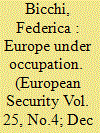

|
|
|
|
|
| Summary/Abstract |
This article shows how the existence of a community of European practitioners in the Jerusalem area gives substance to the European stance on the Israeli–Palestinian conflict. The often-stated European Union (EU) support for a two-state solution could appear meaningless in the absence of peace negotiations. However, European diplomats (i.e. diplomats of EU member states and EU officials) in the East Jerusalem–Ramallah area are committed to specific practices of political resistance to Israeli occupation and recognition of Palestinian institutions. These practices have led not only to a specific political geography of diplomacy, but also to a community of practice, composed of European diplomats and based on their daily experience of resisting occupation and bestowing recognition. It is this group of officials who represent and actively “do” Europe’s position and under occupation.
|
|
|
|
|
|
|
|
|
|
|
|
|
|
|
|
| 7 |
ID:
144728


|
|
|
|
|
| Summary/Abstract |
The paper’s main argument is that Israel’s security policy, which traditionally focused on defending its territorial integrity against regular Arab armed forces, was, by the 2010s, transformed into one that focuses on facing a variety of state- and non-state-based threats. Neo-realist explanations could neither account for the contested nature of the security debate during this period, nor the inconsistent evolution of the policy. The present study aims to solve this conundrum by introducing an alternative approach known as 4th generation strategic culture research. The paper is comprised of four parts. First, the origins and evolution of strategic culture are reviewed, with emphasis placed on the commonly accepted weaknesses that, to date, have prevented it from being used as a testable theoretical concept, and subsequently as an explanatory factor for security policy changes. The second part presents the “modernist constructivism” approach that bridges the gap between traditional constructivism and hypothesis-driven research design. Next, the paper introduces the emerging fourth generation in strategic culture literature, followed by a conceptual framework designed to resolve the inherent weaknesses of the more traditional approaches. Finally, this conceptual framework is applied to analyse the transformation of Israel’s security policy between 1982 and 2014.
|
|
|
|
|
|
|
|
|
|
|
|
|
|
|
|
| 8 |
ID:
148324
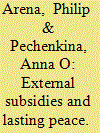

|
|
|
|
|
| Summary/Abstract |
Third parties are thought to face a trade-off in that those actions most likely to bring peace in the short run appear least likely to ensure its long-run stability. Yet the trade-off between conflict management and conflict resolution may be overstated. Analyzing an iterated three-player bargaining model with both information and commitment problems, we first demonstrate two conditions under which third parties may produce lasting peace through conditional subsidies, even without addressing underlying informational or commitment problems. Second, we illustrate this possibility by analyzing the impact of US foreign aid on patterns of conflict and peace between Israel and her neighbors. Our analysis indicates that the termination of the rivalry between Israel and Egypt was most likely not brought about by the Camp David accords or peacekeeping operations, but by sustained foreign aid provision. We discuss the implications for both this conflict and conflict management more broadly.
|
|
|
|
|
|
|
|
|
|
|
|
|
|
|
|
| 9 |
ID:
166768
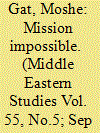

|
|
|
|
|
| Summary/Abstract |
Since entering office, William Rogers had undertaken to advance the peace process between Israel and the Arab states, particularly Egypt. He believed an agreement would serve the American interests at a time when extremism was spreading in the Arab world, and Soviet influence had grown. However, his actions on the political front went unsupported by President Nixon. Moreover, the National Security Advisor had embraced a different policy vis à vis Israel and the Arab world. Rogers' failure to secure an interim agreement and his previous failure to persuade Israel and Egypt to accept his plan, led the entire region back to stagnation, from which it emerged only after the October 1973 Yom Kippur War.
|
|
|
|
|
|
|
|
|
|
|
|
|
|
|
|
| 10 |
ID:
158147


|
|
|
|
|
| Summary/Abstract |
This article explores the use of sport in the formation of an Israeli cultural (multi-ethnic) identity and its historical and contemporary place in the Palestinian–Israeli conflict. The power of sporting events lies in the fact that the teams represent for their fans an ideology beyond the game itself. Supporting a sports team is a primary form of identity for many people. Highly salient sporting events, which are supercharged with emotion and garner eager interest, are also a venue for achieving political objectives on the local, national, and international levels.
|
|
|
|
|
|
|
|
|
|
|
|
|
|
|
|
|
|
|
|
|